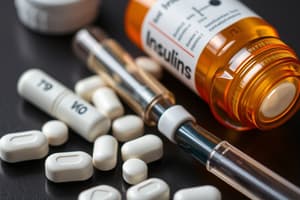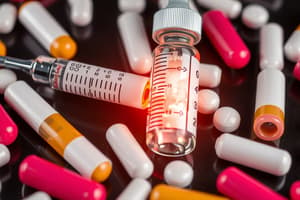Podcast
Questions and Answers
Which of the following is a first-generation sulfonylurea?
Which of the following is a first-generation sulfonylurea?
- Chlorpropamide (correct)
- Dapagliflozin
- Repaglinide
- Glipizide
Which drug is classified as a GLP-1 analogue?
Which drug is classified as a GLP-1 analogue?
- Acarbose
- Semaglutide (correct)
- Linagliptin
- Tolbutamide
What type of medication is Sitagliptin?
What type of medication is Sitagliptin?
- Amylin Analogue
- Alpha Glucosidase Inhibitor
- Dipeptidyl Peptidase-4 Inhibitor (correct)
- Sodium-Glucose Co-transporter 2 Inhibitor
Which of the following medications is a meglitinide?
Which of the following medications is a meglitinide?
Which drug is an example of a sodium-glucose co-transporter 2 inhibitor?
Which drug is an example of a sodium-glucose co-transporter 2 inhibitor?
Flashcards are hidden until you start studying
Study Notes
Insulin Secretion Stimulants
-
Sulfonylureas: Medications that promote insulin release from the pancreas.
- 1st Generation:
- Chlorpropamide: Long-acting sulfonylurea; risk of hypoglycemia.
- Tolbutamide: Shorter duration, lower risk of hypoglycemia than chlorpropamide.
- 2nd Generation:
- Glipizide: More potent than 1st generation; minimal side effects.
- Glyburide: More effective for long-term use; associated with weight gain.
- 1st Generation:
-
Meglitinides: Fast-acting insulin secretagogues.
- Nateglinide: Short duration; effective post meal.
- Repaglinide: Similar mechanism; crucial for managing blood glucose spikes after meals.
GLP-1 Analogues
- Exenatide: Mimics incretin hormones; enhances insulin secretion in response to meals.
- Liraglutide: Long-acting; supports weight loss and improves glycemic control.
- Semaglutide: Reduces appetite; found effective for type 2 diabetes management.
Dipeptidyl Peptidase-4 (DPP-4) Inhibitors
- Linagliptin: No dose adjustment needed for renal impairment; generally well-tolerated.
- Saxagliptin: Effective; risk of heart failure in certain patients.
- Sitagliptin: Widely used; often prescribed in combination therapies.
Sodium - Glucose Co-Transporter 2 (SGLT2) Inhibitors
- Canagliflozin: Decreases renal glucose reabsorption; potential cardiovascular benefits.
- Dapagliflozin: Renal protective; associated with weight loss.
- Empagliflozin: Has cardiovascular and renal protection properties; aids in weight reduction.
Alpha-Glucosidase Inhibitors
- Acarbose: Slows carbohydrate absorption in the intestine; may cause gastrointestinal side effects.
- Miglitol: Similar action to acarbose; helps lower postprandial blood glucose levels.
Amylin Analogues
- Pramlintide: Complement to insulin therapy; helps control post-meal blood sugar levels and promotes satiety.
Insulin Secretion Stimulants
-
Sulfonylureas: Medications that promote insulin release from the pancreas.
- 1st Generation:
- Chlorpropamide: Long-acting sulfonylurea; risk of hypoglycemia.
- Tolbutamide: Shorter duration, lower risk of hypoglycemia than chlorpropamide.
- 2nd Generation:
- Glipizide: More potent than 1st generation; minimal side effects.
- Glyburide: More effective for long-term use; associated with weight gain.
- 1st Generation:
-
Meglitinides: Fast-acting insulin secretagogues.
- Nateglinide: Short duration; effective post meal.
- Repaglinide: Similar mechanism; crucial for managing blood glucose spikes after meals.
GLP-1 Analogues
- Exenatide: Mimics incretin hormones; enhances insulin secretion in response to meals.
- Liraglutide: Long-acting; supports weight loss and improves glycemic control.
- Semaglutide: Reduces appetite; found effective for type 2 diabetes management.
Dipeptidyl Peptidase-4 (DPP-4) Inhibitors
- Linagliptin: No dose adjustment needed for renal impairment; generally well-tolerated.
- Saxagliptin: Effective; risk of heart failure in certain patients.
- Sitagliptin: Widely used; often prescribed in combination therapies.
Sodium - Glucose Co-Transporter 2 (SGLT2) Inhibitors
- Canagliflozin: Decreases renal glucose reabsorption; potential cardiovascular benefits.
- Dapagliflozin: Renal protective; associated with weight loss.
- Empagliflozin: Has cardiovascular and renal protection properties; aids in weight reduction.
Alpha-Glucosidase Inhibitors
- Acarbose: Slows carbohydrate absorption in the intestine; may cause gastrointestinal side effects.
- Miglitol: Similar action to acarbose; helps lower postprandial blood glucose levels.
Amylin Analogues
- Pramlintide: Complement to insulin therapy; helps control post-meal blood sugar levels and promotes satiety.
Studying That Suits You
Use AI to generate personalized quizzes and flashcards to suit your learning preferences.




